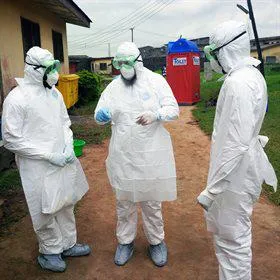01 December 2017
Response to Ebola outbreak leads to improved mental health services in Sierra Leone
A new report highlighting how vital mental health services were developed in Sierra Leone during the response to the 2014 Ebola outbreak is published today in the WHO Bulletin.

A new report highlighting how vital mental health services were developed in Sierra Leone during the response to the 2014 Ebola outbreak is published today in the WHO Bulletin.
The report, which the WHO hopes will act as a blueprint on how to address such emergencies in the future, was written jointly by Sierra Leonean health workers and the King’s Sierra Leone Partnership (KSLP). KSLP brings together expertise from King’s Health Partners and three leading Sierra Leonean health institutions.
The report charts the steps taken to develop an effective mental health care service in a country with a fragile health system. At the time of the Ebola outbreak Sierra Leone had only one specialist psychiatric hospital to serve a population of seven million.
Prior to Ebola establishing itself in the country the Sierra Leonean government had been working with KSLP and other partners to address the lack of mental health service provision. However, the fallout from the outbreak, which included the psychiatric hospital closing its doors to new patients in order to prevent disease transmission, saw government plans to create new mental health units across the country brought forward.
As part of the response a treatment model was created at Connaught Hospital - the adult referral and tertiary government hospital in the capital Freetown - that saw the development of a nurse-led mental health and psychosocial support service, with an inpatient liaison service and outpatient clinic.
To strengthen the skills of the hospital’s non-specialist nurses, mental health awareness training was provided by a mental health nurse and KSLP volunteer.
Mental wellbeing workshops, created and led by the mental health nurse, were held for nurses, auxiliary staff and physicians at Connaught hospital, including those working within the Ebola holding unit. The workshops were made up of a series of half-day sessions which focused on coping with stigma and discrimination, stress management, and self-care.
From March 2015 to February 2016, 143 patients with a wide range of conditions were seen. 20 had survived or had relatives affected by the Ebola virus; half the patients (71) had a range of conditions including mild distress or depression, anxiety disorders, grief, or social problems, while 30 patients presented with psychosis requiring medication.
Speaking about the report Dr Stania Kamara, a KSLP volunteer from the King’s Centre for Global Health and Health Partnerships, said: “The Ebola virus outbreak weakened an already fragile health system and disrupted existing plans to develop mental health services across the country. However, the emergency response provided the opportunity, resources and focus necessary to create new mental health units.
“Our experience in Freetown has guided the establishment of other mental health units across the country; there are now 15 units across Sierra Leone. We hope that our experiences and the models applied will help others around the world successfully implement similar services within an emergency response.”
KSLP continues to support the development of mental health services across the country. It is currently supporting a national network of mental health nurses, in a programme funded by United States Agency for International Development (USAID), through John Snow International.
The KSLP team remains in Sierra Leone and continues to work alongside local partners to help build a strong and resilient national health system that can not only better stand up to disease outbreaks such as Ebola, but can provide high quality care to meet the population’s health needs. Find out more about the partnership’s work on the KSLP website: http://kslp.org.uk/
Notes to editors:
The King’s Sierra Leone Partnership (KSLP) is working alongside local partners to build a strong and resilient health system in Sierra Leone. KSLP brings together King’s Health Partners – itself a partnership between King’s College London, and Guy’s and St Thomas’, King’s College Hospital and South London and Maudsley NHS Foundation Trusts – and three key Sierra Leonean institutions: Connaught Hospital, the country’s main teaching and referral hospital; The College of Medical and Allied Health Sciences (COMAHS), Sierra Leone’s only medical and pharmacy school, and the main institution for basic and specialist nurse training and The Ministry of Health and Sanitation, the branch of government which focuses on issues related to the general health of Sierra Leone’s citizens.
King's College London is one of the top 25 universities in the world (2017/18 QS World University Rankings), among the oldest in England and has an outstanding reputation for world-class teaching and cutting-edge research.
Since our foundation, King’s students and staff have dedicated themselves in the service of society. King’s will continue to focus on world-leading education, research and service, and will have an increasingly proactive role to play in a more interconnected, complex world. World-changing ideas. Life-changing impact: https://spotlight.kcl.ac.uk/
King’s Health Partners is one of only six Academic Health Science Centres (AHSCs) in England and is a partnership between King’s College London and Guy’s and St Thomas’, King’s College Hospital and South London and Maudsley NHS Foundation Trusts.
With a combined budget of more than £3.7 billion, nearly 4.8 million patient contacts every year and 40,000 staff, King’s Health Partners leads two National Institute for Health Research (NIHR) Biomedical Research Centres (BRCs), a wide range of world-leading research programmes, and a comprehensive portfolio of high quality clinical services.
